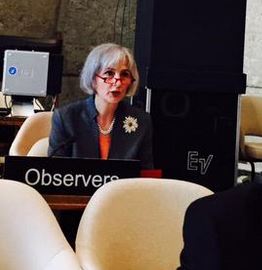IFLA Sets out Library Position on UNESCO Recommendation concerning the Preservation of and Access to Documentary Heritage
06 July 2015
 During the past two years, UNESCO has been working on a new Recommendation stressing the importance of preservation and access to documentary heritage (including in digital form). IFLA has provided comments to the previous drafts and was present at the first expert meeting in Warsaw, Poland in June 2014, in an effort to ensure that the Recommendations will enable libraries and archives to fulfil their mandate.
During the past two years, UNESCO has been working on a new Recommendation stressing the importance of preservation and access to documentary heritage (including in digital form). IFLA has provided comments to the previous drafts and was present at the first expert meeting in Warsaw, Poland in June 2014, in an effort to ensure that the Recommendations will enable libraries and archives to fulfil their mandate.
The current draft was now being discussed by Member States, experts from the field and relevant NGOs.
IFLA gave an intervention at the expert meeting to underline the importance of this Recommendation for libraries and archives and to highlight some points which could easily strengthen the Recommendation.
1-2 July 2015, UNESCO, Paris
Intervention given by Victoria Owen, Chair of the IFLA CLM Committee
Thank you Madam Chair for inviting us to speak
My name is Victoria Owen and I speak for IFLA, the International Federation of Library Associations and Institutions, representing libraries and their users worldwide. One of IFLA’s core missions is to protect, safeguard and guarantee access to information and documentary cultural heritage.
We would like to thank UNESCO for facilitating this once-in-a-decade opportunity to further strengthen preservation and access to documentary heritage through the proposed Recommendation.
IFLA welcomes the Recommendation and would like to stress that it can be easily strengthened prior to its review at the General Conference. The amendments that IFLA proposes align with the spirit of the UNESCO Vancouver Declaration and would enable libraries, archives and holders of documentary heritage material to fulfil their mandate in our modern age.
IFLA would like to recommend to UNESCO and its Member States that the document be amended to:
Recognize the societal role and professional responsibilities vested in public memory institutions, such as libraries, archives, and museums, to enable discovery, preservation and access to digital heritage material entrusted to them.
We like to urge Member States to:
Urgently amend national copyright codes, allowing for adequate limitations and exceptions for memory institutions to preserve and provide access to documentary heritage material in all its forms. We ask for urgent action in this matter because we know that the very existence of documentary heritage material is threatened due to the lack of digital preservation frameworks.
With these two easily implemented changes IFLA believes that the Recommendation would be an effective instrument in assisting the core mission of memory institutions worldwide to preserve and provide access to digital heritage material and immeasurably strengthen the mission of the UNESCO Memory of the World programme.
Thank you very much for your attention.
The meeting was fruitful and IFLA achieved the recognition of memory institutions in the text. This gives great emphasis and acknowledgement to the societal role of libraries and archives and helps institutions to fulfil their mandate. On the issue of providing adequate legal frameworks to execute the mission entrusted to memory institutions, we achieved the inclusion of language on exceptions and limitations; in addition the interests of rightsholders were added, as was an encouragement to harmonization of legislation among states. The right of access in the public interest was acknowledged and the recommendation will help libraries and archives to provide this.
Next steps
Following the two day meeting, IFLA will now continue to engage with UNESCO and the draft Recommendation which will be presented to the UNESCO General Conference in November 2015.